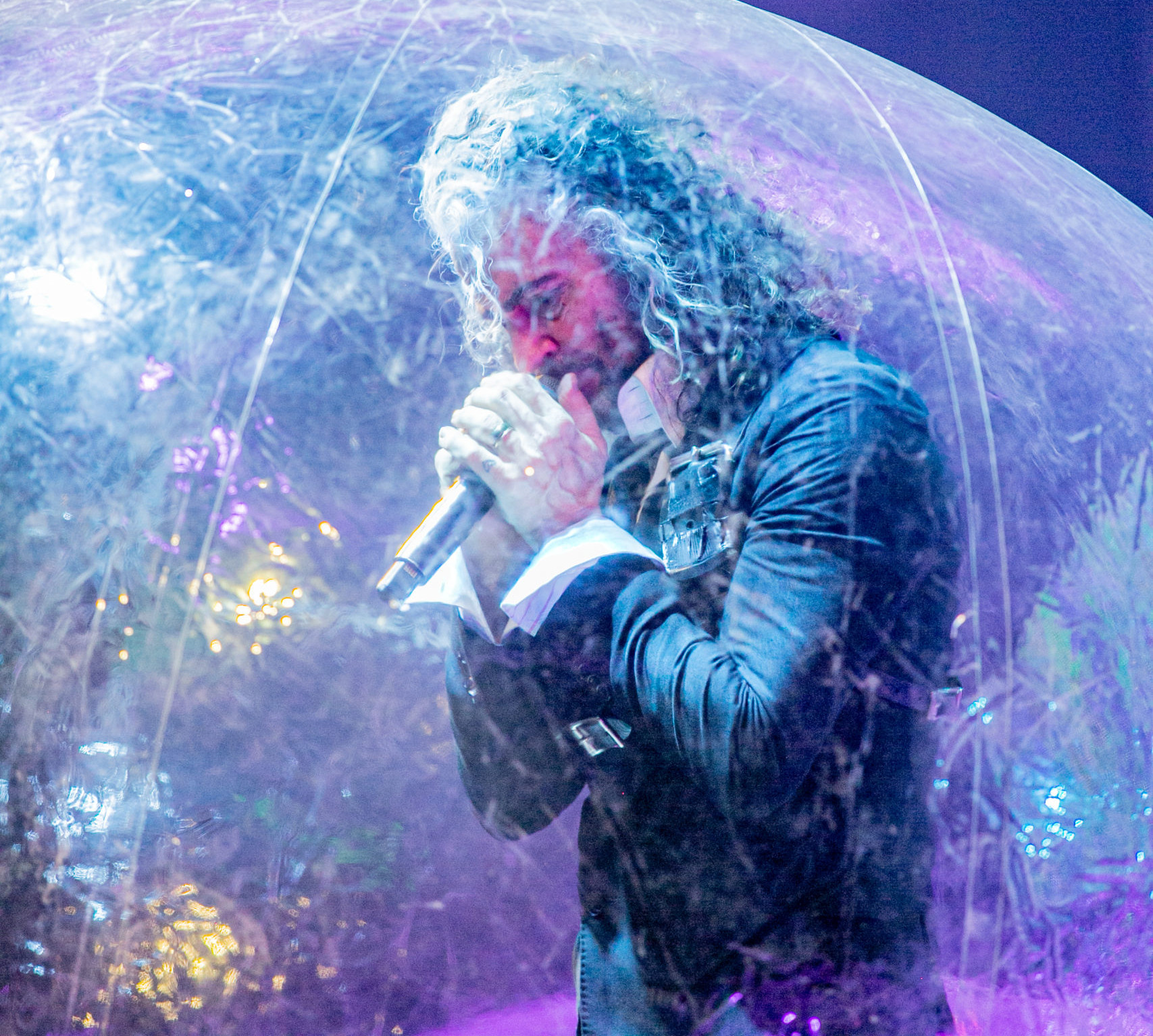George Harrison released his third solo project, the expansive triple-LP All Things Must Pass, in November 1970. And its songs — like “My Sweet Lord,” “Wah-Wah,” “Isn’t It a Pity,” “Behind That Locked Door,” and “Beware of Darkness” — solidified the former Beatle‘s signature balance of earthly and divine, from his soulful slide-guitar to the searching spirituality of his lyrics.
To celebrate the album’s “50th” anniversary reissue — including the massive Uber Deluxe Edition, complete with gnome replicas — SPIN spoke to three famous Harrison fans about his early masterpiece. Below, Jim James (My Morning Jacket), Wayne Coyne (The Flaming Lips) and Angel Olsen go deep on the influence and legacy of All Things Must Pass — and Harrison himself.
Jim James (My Morning Jacket)

“Truly a Masterwork”
I think [All Things Must Pass] is one of the rare albums of that length that’s almost all great. There are a lot of super long albums that may have two good songs on them. But it’s pretty remarkable that out of that entire album, there’s only a couple questionable songs — and those are almost so goofy that you forgive them anyway. The album, being the length it is, is truly a masterwork. I tell people to take time to focus on the song “Out of the Blue.” It’s one of my favorite instrumentals of all time, and it’s what inspired me to want to play the saxophone in a lot of ways. I love the saxophone on that song. Just the dark way that song jams and riffs. There’s such a mystery there, and I feel like it’s the key to the mystery in a lot of George’s music. But it’s interesting because there are no words or vocals.
Hope in the Darkness
[With] “Hear Me Lord,” there’s just desperation in his voice. I feel like that song has gotten me through a lot of times when I’ve felt so desperately sad or desperately alone. I think it’s one that’s often passed over as well. Those songs are pretty dark, but there’s a real hopefulness in there. That’s what I’ve always loved about George’s music: He’s not afraid to get dark, but he never leaves you hopeless. He always brings you back to the “inner light” — no pun intended.
“Holy Document”
When I look back at my life — at least right now, the current version of me — if I had to only listen to one song, I would pick “My Sweet Lord.” I do that a lot. I’ll listen to that song for weeks. That’s all I’ll listen to. It kind of gives me everything I want in a song. And if you leave it on repeat, it can really take you into a beautiful trance state, no matter what you’re doing — taking a hike or taking a drive or sitting at home. It’s so powerful. It’s along a similar line of Marvin Gaye’s “What’s Going On.” It’s like all the forces of heaven and earth and everywhere we can’t understand came together to make this holy document.
“Musical Spirit Guide”
I would say George’s spirit is present through a lot of my work. He really inspires me. I think of George Harrison and Alice Coltrane as my two main musical spirit guides because their music is so sacred. It’s so sensual and tied to the earth and tied to love, but it’s so beyond anything we could ever understand. I pray to Alice Coltrane, and I pray to George Harrison to guide me. I try to imagine each of them with one hand on my shoulder, and I try to feel, “What would they do here?” I try to listen to them through their music. I think there’s so much of George Harrison’s spirit, or whatever you want to call it, in so much of what I’ve done.
Wayne Coyne (the Flaming Lips)
 John Lennon/Yoko Ono stuff in with the Beatles. It wasn’t until much later that I started to think, “Oh, that’s this record. This is after the Beatles broke up.” It was the same with George.
John Lennon/Yoko Ono stuff in with the Beatles. It wasn’t until much later that I started to think, “Oh, that’s this record. This is after the Beatles broke up.” It was the same with George.
When you even think of [those bands], they weren’t listening to stuff from Liverpool — they were listening to American R&B and blues. So it makes perfect sense that some hippie kids from Oklahoma could be listening to music from England. It was our version of what they did. And of course, you couldn’t have gotten away from it. The whole universe liked it.
Learning “Love”
It wasn’t even just their music — it was the way they looked and that you could hear them talk. They had movies, and they had opinions about world affairs. Being in Oklahoma, hearing something that was so foreign — that you wouldn’t hear in everyday life — it blew my mind, and it still blows my mind. I think all that helped shape what we thought about music and creativity and art — and even the word “love.” We knew what it was, but in our house, it’s not like our dad went around saying “I love you.” It was through the Beatles that we learned how to say it. [Laughs.] In my father’s defense, it’s a lot easier and more fun to sing that you love someone than to say it — it’s less painful or confrontational or emotional.
A Beatles/Lips Analogy
I think this is a perfect analogy for how the Flaming Lips came to be the Flaming Lips: We would always use the Beatles as an example. They do songs like “Revolution 9” and they do songs like “Yesterday.” But they only did one song like “Revolution 9” and they did a bunch like “Yesterday.” [Laughs.] The Flaming Lips would go the other way: “We do a bunch of songs that are kind of like ‘Revolution 9,’ and occasionally we’ll get around to doing one like ‘Yesterday.’”
“A Great Feat for a Catchy Song”
With “Isn’t It a Pity,” if you think about the way he sings those lines, you really can sort of skip over them and think, “I’m just singing something,” but they’re broken-up sentences where the meaning isn’t always at the end of the line. Even just that sentiment — it’s a very George Harrison thing to say. That’s one of the things he does. He stands up on the throne and says, “Isn’t it a pity that we all don’t love each other?” We know he really means “us” — I don’t think he means him. There’s a sense of “I know better than you do,” and that’s part of the charm in a way. I love the song. It always feels like he’s telling you about it, rather than him being included in it. That’s a great feat for a catchy song. It’s a strange thing to sing about, yet we all walk away singing it.
When Songs Speak “Spiritually”
I can listen to something where he sings “My Sweet Lord,” and I can know exactly what it means without it having to mean “I’m a Christian” or “I’m a Buddhist.” It can be this belief in the wonders of the universe that we don’t understand. I can sing a Christmas song. I can sing a religious song. I can sing a George Harrison song. Something deep inside of us is thankful for this wondrous, weird shit that we’re doing, and we hope that with whatever it is — the random chaos of this universe — that it shows mercy on us. And [there’s] just the wonder of what love is. It’s like, why do we love each other as opposed to it just being aggressive chaos all the time? You see that with butterflies and worms and animals and everything. That’s the part where you say, “I don’t know why it’s the way it is.” As much as we love science and evolution, there are still great mysteries as to…how the fuck? It’s still impenetrable and beautiful.
When you sing a song, part of your mind is not deciding, “It’s about religion” or “It’s about God.” It’s just going to that little molecule inside of you that we all know is there, and I just think George is brave enough to sing about it and not give a fuck. He’s like, “I believe in this,” and I think he’d probably say, “It allows you to believe whatever you want to believe.” It’s just a song! It’s not a weapon. It’s not throwing you in jail. It’s not your job. It’s not anything that’s really important. You’re free to love it this year and hate it next year if you want. I say that because to me that’s the only music can really work. It’s like food — you should be free to like what you like. You don’t have to be smart, cultured or anything. If you want to eat frozen pizza and think it’s the greatest thing ever, more power to you. If you like it, sing it, brother!
Part of what George did is so catchy and so wonderful to listen to: his voice and the production and all [that] stuff. Even if you analyzed it and said, “I don’t agree with [the words],” it would be hard not to sing along with it anyway. I never worry about that. I think music is the great bringer — it brings everyone together anyway. It doesn’t matter what the song is saying literally. It’s really what it’s saying spiritually, in a way.
Dressing Up, Playing Beatles at the 2014 George Fest Tribute Show
Like all those things, in the beginning it was like, “It’s gonna be amazing” — [the Flaming Lips] did “It’s All Too Much,” which is a crazy-sounding song and a crazy song to get to figure out. Then you get there, and it’s like, “Ah fuck, there are a lot of great people up there.” You’re sort of intimidated by everybody being so great. It’s great while you’re thinking about it, terrifying while you do it and then great as soon as you’re done: “Oh, shit, we did it — I hope it worked!” [Laughs.] You don’t want it to be sloppy or sing the wrong words. But we absolutely loved it. I remember I dressed up like George — I don’t know if anybody noticed. Remember how he wore that big fur coat on the roof during Let It Be? I had some great tennis shoes and some cool green jeans and this big black fur coat, and I wore it like, “I’m gonna be looking like George today.” If you look at pictures from that, you’ll be like, “Look at that!”
Angel Olsen

I was really romanticizing that feeling, and for me it was all about not being seen any more — or people assuming they’ve decided you based on the image you created or the thing you made, and that’s the entirety of your being to people, which is not the case. But that is the consequence of putting yourself out there as an artist. That’s one of the things we have to carry: the consequence of what people imagine your life is and what they’ve decided it is for you and how you get to see that based on how your music is talked about or promoted. It’s always interesting to realize how people see you based on something you put out into the world that’s just a sliver of yourself. I feel like I really related to that song and gravitated toward it.
“You’re Almost Out”
All Things Must Pass is something I always listened to in the car, in the van, or in the bus or wherever I was. Just an incredible record. In different times of struggle or heartbreak in my life, I’ll always revisit it. It’s the perfect record for “You’re almost out! You’ve made it out of this thing.” A lot of the songs are about loving someone and falling in love too. But those feelings are really similar to me: the feeling of falling in love and that feeling of really finding your way through something. You kind of fall in love with yourself and life again, and you start to hear things that people are saying differently. You’re tapping into synchronicity, and you’re able to be open to hear people that normally you’d be too wrapped up to hear. That record is really perfect for that mood or that moment that really encapsulates that experience.
Synchronicity, Part One: Magical Baby Owl
This last summer, during the pandemic, I was really going through a lot of changes, like everybody else. I remember sitting on the back deck with one of my best friends who’s in my pandemic pod, and we were just joking around. This is a really trippy [story]. We were listening to a lot of George and drinking wine and smoking cigarettes — getting into bad habits again. Playing that record over and over again. She’d be like, “What do you want to do today?” We’d write or talk about stuff we wanted to work on. Maybe there’d be something we needed to talk about in our lives, and we’d listen to the record. [One day] I looked up, and there was this baby owl perched in a tree in my backyard. It just felt really magical, like, “Wow, George’s spirit is here.” We were joking around about it.
Synchronicity, Part Two: Cardboard Cutout
Maybe a month later we drove to St. Louis because my mother was sick, and [my friend] came with me. On the way there you go through this town in Illinois [Benton], and there was this cardboard cutout of George and someone else on the side of the highway. We were like, “This is fucking weird. We just keep seeing this shit everywhere.” At the time it was really intense because we hadn’t seen people and I was about to go to St. Louis, and we’d been listening to this record and saw the bird. We saw this cutout, so I was like, “Let’s stop. Let’s check out this town and see if there’s any reason why this is here.”
We found this music store right off the highway. They were selling everything — I guess the owner had just recently passed, and I think the wife was trying to get rid of everything. You’d ask, and she’d be like, “That’s five dollars.” We were like, “What’s the story with the sign?’ And she was like, “Oh, George’s sister [Louise] lived here. She lived here since before the Beatles were famous.” I was like, “What?” It was wild. We were like, “Not to be rude, but why?” [Laughs.] I guess before the Beatles made it in the U.S., she was living here first and was married to someone who was in mining. The wife of the deceased store owner was like, “She lived here for along time. She manages a Beatles cover band [in Branson].” I was like, “This is so trippy.”
Synchronicity, Part Three: Gnomes in the Yard
[Then] I did a cover of “Beware of Darkness” and put it up online. I was just inspired and going though some stuff and was like, “Fuck it.” So I put it up online and may manager said, “Oh, George’s people retweeted your performance,” and I was like, “Whoa, this is crazy.” A few weeks ago I received one of the All Things Must Pass gnome sets. I thought it was a gift from someone at my label, but I guess it’s from their team. I put them all around my yard.
View this post on Instagram
“Really Special and Really Pure”
[With All Things Must Pass], it’s never been, “Oh, the way it’s recorded at this studio — with this person and the energy they had and Eric Clapton coming in.” It’s never been about that stuff for me. These songs are really special and really pure — this person is really trying to find peace within themselves. Maybe the world has been dealing them one thing after another, and they have to continually try to find that peace, which we all have to do. I really relate to that. Also, it just sounds fucking good. It’s so good. [Laughs.]





